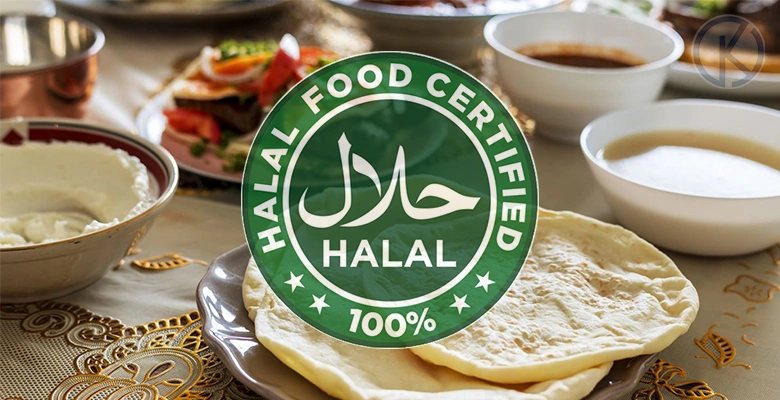What is Halal? A Comprehensive Guide to its Principles and Importance
Estimated reading time: 15 minutes
Key points
- Halal is an Arabic term meaning “permissible” or “lawful” according to Islamic law (Sharia).
- The opposite of Halal is Haram (prohibited).
- Halal principles apply to many aspects of life, including food, finance, cosmetics, and tourism.
- For food, Halal requires it to be free of Haram ingredients and meat must be slaughtered according to the Zabiha ritual.
- Halal certification ensures products comply with standards and helps consumers easily identify them.
- Adhering to Halal brings spiritual, health, safety, and economic benefits.
Table of Contents
- Introduction
- The Concept of Halal and its Definition According to Islamic Law
- Halal Principles in Food and the Importance of Halal Certification
- Halal Principles in Other Fields
- Benefits of Adhering to Halal Principles
- How to Identify Halal Products in the Market
- Conclusion: Understanding What Halal Is and Its Importance
- Frequently Asked Questions (FAQ)
Introduction
In an increasingly connected and culturally diverse world, understanding concepts from different cultures has become more important than ever. One of the terms you may often hear, especially in the food and consumer sectors, is “Halal”. So, what is halal? Simply put, Halal is an Arabic term meaning “permissible” or “lawful” according to Islamic law (Sharia). It is a core concept in Islam, guiding believers on what is permissible to consume, use, or engage in.
Learning about Halal principles is not only important for the Muslim community worldwide, helping them adhere to religious obligations in their daily lives, but it also offers value to non-Muslims. For businesses and consumers in general, understanding Halal opens the door to a rapidly growing global market. Furthermore, Halal standards often emphasize food safety, ethical consumption, and respect for cultural diversity, benefiting everyone.
This article will provide a comprehensive and detailed overview of Halal. We will explore:
- The concept, origin, and cultural significance of Halal.
- Halal principles applied in food and other sectors such as finance, cosmetics, and tourism.
- The spiritual, health, and economic benefits of adhering to Halal standards.
- How to identify Halal-certified products in the market.
Let’s delve deeper into what Halal is and why it holds special importance in the modern world.
The Concept of Halal and its Definition According to Islamic Law
Detailed Definition of Halal and the Difference Between Halal and Haram
As mentioned, “Halal” is an Arabic term that refers to what is permissible or lawful according to Islamic law. It is a central concept that encompasses many aspects of a Muslim’s life, from food and drink to behavior, speech, and financial transactions. The direct opposite of Halal is “Haram,” another Arabic term meaning “prohibited” or “unlawful.”
The distinction between Halal and Haram is fundamental to the practice of the Muslim faith. The Qur’an, the holy book of Islam, along with the Hadith (the teachings and actions of the Prophet Muhammad), provide clear guidance on what is considered Halal and Haram. Adherence to these regulations is not only a religious obligation but is also believed to bring spiritual and physical benefits to believers.
The concept of Halal is not just limited to eating and drinking. It applies to every aspect of life, including:
- Food and drink: Regulating what is permissible to eat and drink.
- Actions and behavior: Guiding on ethics, social conduct, and religious rituals.
- Financial transactions: Setting principles for lawful business and financial activities.
- Dress and grooming: There are regulations on how to dress and use cosmetics.
Understanding the difference between Halal and Haram helps Muslims navigate their lives in accordance with the teachings of their religion, ensuring that all actions and choices are consistent with their faith.
The Origin and Cultural Significance of Halal
The origin of Halal is deeply rooted in the fundamental religious texts of Islam: the Qur’an and the Sunnah (which includes the Hadith). These sources clearly define the principles and regulations governing what is permitted and prohibited. For example, the Qur’an strictly forbids the consumption of pork, blood, animals that die without proper Islamic slaughter, and intoxicants such as alcohol.
Beyond specific food regulations, Halal carries a profound cultural and ethical meaning. It is not just a list of rules to follow but a way of life, a philosophy that emphasizes purity, piety, and moral responsibility. Choosing Halal is an expression of obedience to God (Allah) and a commitment to living a righteous, ethical life.
In many Muslim communities, Halal practices are intertwined with cultural and religious identity. Halal meals are often the centerpiece of family and community gatherings. Adherence to Halal principles strengthens the bond between believers and creates a shared sense of purpose and value. It also reflects a concern for animal welfare and environmental sustainability, values that are increasingly important in modern society.
General Principles Defining Halal
Although detailed regulations may vary slightly among different schools of Islamic law, there are several fundamental general principles that define what is Halal:
- Clear origin: Everything is fundamentally considered Halal unless there is specific evidence to suggest it is Haram. However, the origin of a product, especially food, must be known to ensure its lawfulness.
- Prohibition of Haram substances: Certain specific substances are strictly prohibited (Haram) in Islam and are not allowed to be consumed or used. These substances include:
- Pork and its by-products.
- Blood.
- Carnivorous animals with fangs (such as dogs, cats, tigers).
- Birds of prey with talons (such as eagles, hawks).
- Amphibians (such as frogs).
- Insects (except for locusts).
- Animals that died before being slaughtered according to Islamic rites (carrion).
- Animals not slaughtered in the name of Allah.
- Alcohol and other intoxicants.
- Ritual slaughter (Zabiha): For meat (except fish and seafood), the animal must be slaughtered according to a specific ritual called Zabiha. This process requires:
- The slaughterer must be a sane, adult Muslim.
- The name of Allah (Bismillah) must be invoked before the slaughter.
- A sharp knife must be used to make a swift, deep incision in the throat, cutting the jugular veins, carotid arteries, and windpipe.
- The purpose is to minimize the animal’s suffering and to allow the blood to drain completely.
- The animal must be treated humanely before and during the slaughter process.
- Avoiding cross-contamination: Halal products must not come into contact or be mixed with any Haram substances during preparation, processing, storage, or transportation. This requires strict separation of Halal and non-Halal utensils, equipment, and processing areas. For example, cooking oil used to fry pork cannot be used to fry Halal food.
These principles form the foundation of the Halal lifestyle, ensuring that Muslim believers can live in accordance with their faith in all aspects.
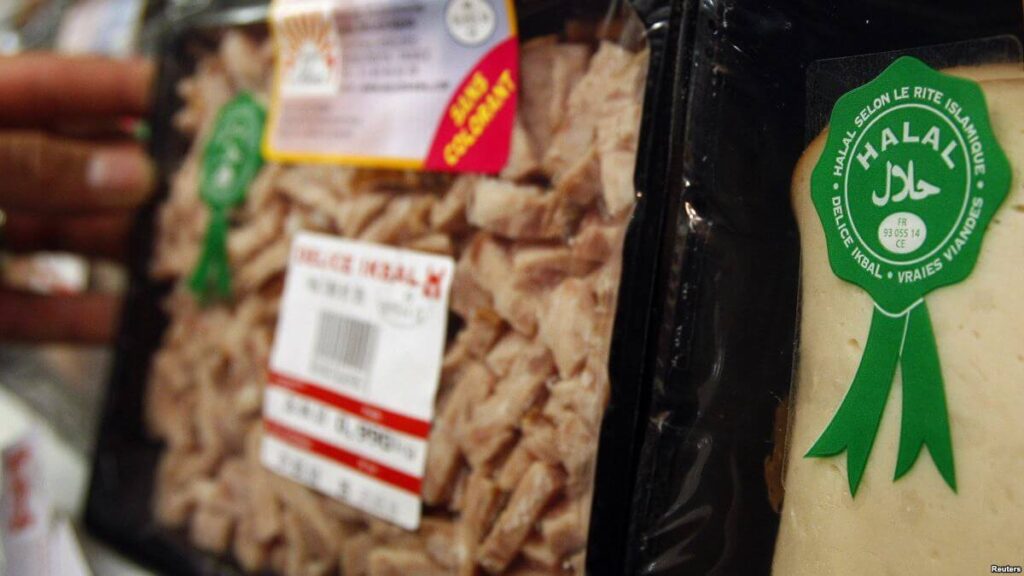
Halal Principles in Food and the Importance of Halal Certification
Specific Rules for Preparing Halal Food
The food sector is where Halal principles are most commonly and strictly applied. For a dish or food product to be considered Halal, it must adhere to specific rules throughout the entire process from farm to table.
The main rules include:
- Free from Haram ingredients: Halal food must absolutely not contain any ingredients that are prohibited (Haram) under Islamic law. This includes pork, lard, alcohol, blood, and extracts from animals not slaughtered according to the Zabiha ritual (e.g., pork-based gelatin, certain enzymes).
- Source of Halal meat: All meat and poultry must come from animals slaughtered according to the proper Zabiha ritual as described in the previous section. This ensures the lawfulness of the meat from an Islamic perspective.
- No cross-contamination: The preparation, processing, packaging, storage, and transportation of Halal food must be done in an environment completely separate from Haram substances. Any contact, however minimal, with non-Halal utensils, surfaces, or ingredients can render the food no longer Halal.
- For example: Knives, cutting boards, pots and pans, cooking oil, kitchen areas, and production lines must be dedicated to Halal food or thoroughly cleaned according to Halal procedures before use.
- Additives and processing aids: Additives, flavorings, food colorings, enzymes, and other ingredients used in processing must also be Halal. This requires manufacturers to thoroughly check the origin and production process of each ingredient.
Strict adherence to these rules ensures that Muslim consumers can be confident that the food they eat is fully compliant with their religious requirements.
Permitted and Prohibited Ingredients
To clarify further, below is a list of common ingredients classified as Halal or Haram:
Halal Ingredients (Permitted):
- Meat and Poultry: Only when slaughtered according to the Zabiha ritual. This includes beef, lamb, goat, chicken, duck, turkey, etc.
- Fish and Seafood: All types of fish with scales and most other types of seafood are considered Halal. No special slaughter ritual is required.
- Milk and Eggs: From Halal animals (e.g., cow’s milk, chicken eggs) are Halal.
- Fruits and Vegetables: All types of fresh or processed fruits and vegetables (frozen, canned, dried) are Halal, provided they are not processed or mixed with Haram ingredients.
- Grains and grain products: Rice, wheat, corn, oats, bread, pasta, etc., are Halal, unless they contain Haram ingredients (e.g., lard in some pastries).
- Honey: Is Halal.
- Vegetable oils: Most vegetable oils (olive oil, sunflower oil, soybean oil, etc.) are Halal.
- Halal additives: Gelatin from Halal sources (Zabiha-slaughtered beef, fish), plant-based or microbial enzymes, vegetable glycerol, etc.
Haram Ingredients (Prohibited):
- Pork and pork products: Pork, lard, bacon, ham, pork sausage, etc., and any product containing ingredients derived from pigs.
- Meat from non-Halal slaughtered animals: Beef, lamb, chicken, etc., if not slaughtered according to the Zabiha ritual.
- Blood: In liquid or dried form.
- Alcohol and intoxicants: Alcoholic beverages, alcohol used as an ingredient in food (e.g., vanilla extract with alcohol), etc.
- Carnivorous animals and birds of prey: Meat from dogs, cats, tigers, eagles, etc.
- Carrion: Animals that die naturally or by accident before being slaughtered.
- Gelatin from Haram sources: Usually gelatin from pigs or from non-Halal slaughtered cattle.
- Certain Enzymes: Enzymes derived from Haram animals (e.g., pepsin from pig stomachs).
- Lard and Shortening from Haram animal sources.
- Products with cross-contamination: Any Halal food that comes into contact with Haram ingredients.
Recognizing these ingredients is crucial for consumers who wish to follow a Halal diet.
The Importance of Halal Certification
In the context of an increasingly complex global food supply chain, determining whether a product truly adheres to Halal principles can be a challenge. This is where the importance of Halal certification becomes clear.
Halal certification is a process in which an independent, reputable, and recognized certification body assesses and confirms that a product, process, or service complies with Halal standards according to Islamic law. This process typically includes:
- Ingredient inspection: Thoroughly reviewing all raw materials and additives.
- Production process assessment: Inspecting facilities, equipment, cleaning procedures, and measures to prevent cross-contamination.
- Slaughter inspection (if applicable): Verifying that the slaughter process complies with the Zabiha ritual.
- Employee training: Ensuring that staff understand and adhere to Halal requirements.
- Periodic audits: Conducting regular inspections to ensure ongoing compliance.
When a product or facility meets all the requirements, the certification body issues a Halal certificate and allows the use of the Halal logo on the product packaging.
Benefits of Halal Certification:
- Ensures compliance: Provides assurance to Muslim consumers that the product meets their strict religious requirements.
- Builds trust: The Halal logo is a mark of trust, helping consumers easily identify and choose suitable products.
- Market expansion: Helps manufacturers and exporters access the vast global Halal market, which includes nearly 2 billion Muslims and also non-Muslim consumers seeking safe, high-quality, and ethical products.
- Enhances brand reputation: Demonstrates a company’s commitment to quality, safety, and respect for cultural and religious values.
- Ensures food safety: Halal standards often go hand-in-hand with strict hygiene and quality control requirements, contributing to overall food safety.
Therefore, Halal certification plays a crucial role in connecting producers with consumers in the rapidly growing Halal market.
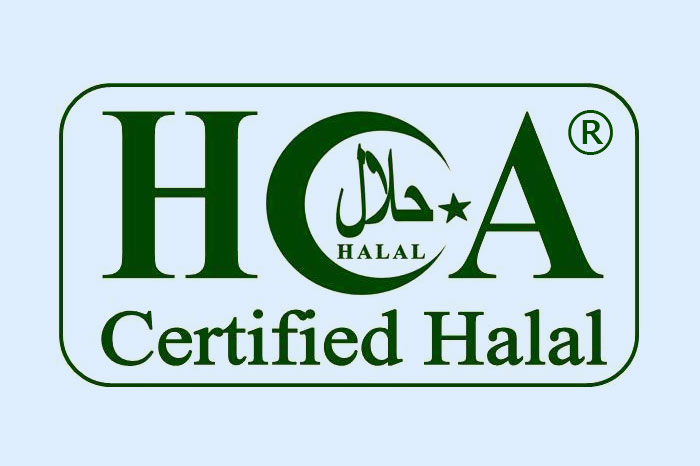
Halal Principles in Other Fields
The concept of Halal is not limited to food but extends to many other areas of modern life, reflecting a comprehensive value system based on Islamic law.
Halal Finance and Banking
Halal finance, also known as Islamic finance, is a financial system that operates based on the principles of Sharia. The goal is to ensure that financial activities are conducted fairly, ethically, and without violating the prohibitions of Islam.
The main principles of Halal finance include:
- Prohibition of Riba (Interest): Sharia strictly prohibits charging or receiving interest in any form. Instead, Islamic financial institutions use structures based on risk-sharing and profit-sharing, such as:
- Mudarabah: An investment partnership where one party provides the capital and the other provides expertise, with profits shared according to an agreement, and losses borne by the capital provider.
- Musharakah: A joint business venture where all parties contribute capital and share profits and losses according to their capital contribution ratio.
- Murabaha: A cost-plus deferred sale, where the bank buys an asset at the customer’s request and sells it back to the customer at the original cost plus an agreed-upon profit margin, with payment made in installments.
- Ijara: A lease, similar to a conventional asset lease agreement, which can include an option to buy (Ijara wa Iqtina).
- Prohibition of Gharar (Uncertainty, excessive speculation): Transactions involving uncertainty, ambiguity, or excessive speculation are forbidden. Contracts must be clear and transparent regarding their terms, subject matter, and price.
- Prohibition of Maysir (Gambling): All forms of gambling or profiting from chance are prohibited.
- Ethical investment: Investment in industries or companies whose business activities are considered Haram is forbidden, such as those involved in alcohol, pork, gambling, weapons, or interest-based financial services.
- Real assets: Islamic finance emphasizes transactions based on real, tangible assets, rather than complex, abstract financial instruments.
The Halal financial system is growing rapidly worldwide, offering products such as savings accounts, home financing, insurance (Takaful), and Sharia-compliant investment funds.
Halal Cosmetics and Personal Care Products
Similar to food, cosmetics and personal care products can also be Halal certified. Halal cosmetics must meet the following requirements:
- Free from Haram ingredients: The product must not contain prohibited ingredients such as:
- Alcohol (the intoxicating type, usually ethanol). Some fatty alcohols like cetyl alcohol may be acceptable.
- Ingredients derived from pigs (e.g., pork collagen, gelatin).
- Ingredients from animals not slaughtered according to Halal methods.
- Blood, human or animal placenta.
- Clean production process: The manufacturing facility and equipment must be clean and free from contamination by Haram substances.
- Ethical sourcing: Many Halal standards also emphasize ethical sourcing of ingredients, being cruelty-free (not tested on animals), and sustainable.
- Safe and non-toxic: Halal products often focus on natural ingredients that are safe for users.
Halal certification in the cosmetics industry assures Muslim consumers that the products they use on their bodies are pure and religiously compliant. The Halal cosmetics market is also attracting interest from non-Muslim consumers seeking vegan, natural, and ethical products.

Halal Tourism and Hotels
Halal Tourism is a growing segment of the tourism industry that caters to the specific needs of Muslim travelers. The goal is to create a friendly travel environment where tourists can enjoy their vacation without worrying about violating their religious principles.
Key elements of Halal tourism and hotels include:
- Halal food: Providing Halal-certified dining options at hotels, restaurants, and on flights.
- No alcohol served: Many Halal establishments are completely alcohol-free.
- Prayer facilities: Providing separate prayer rooms or prayer mats in hotel rooms, along with a Qibla direction marker (pointing towards Mecca). Providing information on prayer times and local mosques.
- Separate facilities: Offering separate recreational and relaxation facilities for men and women, such as swimming pools, spas, and gyms at different times or in separate areas.
- Modest dress code: Staff dress modestly, and there may be dress code guidelines for guests in common areas.
- Appropriate entertainment: Offering entertainment options and tours that are consistent with Islamic values, avoiding activities considered Haram.
- Muslim-friendly washrooms: Providing water hoses (bidets) or similar facilities in bathrooms.
Halal tourism is not limited to Muslim countries; destinations worldwide are increasingly developing these services to attract the growing number of Muslim tourists.
The extension of Halal principles into these areas demonstrates the comprehensiveness of Islamic law and the efforts of Muslims to apply their faith to every aspect of daily life.

Benefits of Adhering to Halal Principles
Adhering to Halal principles brings numerous benefits not only in a religious sense but also in terms of health, safety, and economics. These benefits are not limited to Muslims but can also extend to the broader community.
Spiritual and Religious Benefits
For Muslims, the most important benefits of adhering to Halal are spiritual and religious:
- Expressing obedience to God: Adhering to Halal is an act of worship, demonstrating loyalty and obedience to the commands of Allah as stated in the Qur’an and Sunnah. This brings inner peace and a stronger connection to one’s faith.
- Attaining God’s pleasure: Muslims believe that living according to Halal principles will earn them God’s pleasure and reward in both this life and the hereafter.
- Purifying the soul and body: Halal is not just about what is permissible to eat but also about maintaining purity in thoughts, words, and actions. Avoiding Haram is believed to help purify the soul and protect the body from negative influences.
- Strengthening Islamic identity: Practicing Halal is an important part of Islamic identity, helping to preserve religious values and traditions across generations.
- Enhancing community consciousness: Sharing and adhering to Halal standards together helps strengthen the bonds and solidarity within the Muslim community. Halal meals and Halal-compliant community events create a safe and familiar common space.
Health and Safety Benefits
Beyond religious significance, Halal standards are often associated with practices that offer health and safety benefits, attracting even non-Muslims:
- Hygiene and Food Safety: The Halal certification process requires strict hygiene standards throughout the entire production process, from raw materials to the finished product. This includes cleaning equipment, preventing cross-contamination, and quality control, contributing to safer products.
- Humane slaughter and blood drainage: The Zabiha slaughter ritual, with its swift, deep cut, is designed to minimize the animal’s pain. More importantly, it ensures that blood is completely drained from the animal’s body. Blood is a favorable medium for bacterial growth; its removal helps keep the meat fresh longer and reduces the risk of bacteria-related illnesses.
- Avoiding potentially harmful substances: The prohibition of substances like alcohol and pork (which can carry parasites if not thoroughly cooked) can be seen as a health precaution.
- Emphasis on natural foods: Although not all Halal products are organic or natural, the general trend in the Halal market is towards wholesome, less-processed ingredients with clear origins.
- Traceability: The Halal certification process often requires clear traceability of ingredients, which helps ensure transparency and product quality.
Many non-Muslim consumers choose Halal products believing they are produced to higher standards of hygiene, safety, and ethics.
Economic Impact and Market Growth
The global Halal market is one of the fastest-growing economies in the world, bringing significant economic impacts:
- Huge market size: With a global Muslim population of nearly 2 billion and growing, the demand for Halal products and services is immense. This market includes not only food but also finance, cosmetics, pharmaceuticals, tourism, and fashion. The value of the global Halal market is estimated in the trillions of US dollars and is expected to continue its strong growth.
- Export opportunities: For countries and businesses, obtaining Halal certification opens the door to lucrative export markets in Muslim countries and Muslim communities in the West. This is a significant competitive advantage.
- Attracting non-Muslim consumers: As mentioned, the values of safety, hygiene, ethics, and quality of Halal products are increasingly attracting a large number of non-Muslim consumers, helping to expand the market size.
- Driving innovation: The demand for diverse and high-quality Halal products drives innovation in many industries, from developing Halal alternative ingredients (like Halal gelatin) to creating Sharia-compliant financial and technological products.
- Creating jobs and economic development: The growth of the Halal industry creates numerous jobs in manufacturing, processing, certification, marketing, logistics, and services.
Understanding and participating in the Halal market not only brings direct economic benefits but also demonstrates business acumen and the ability to meet the diverse needs of global consumers.
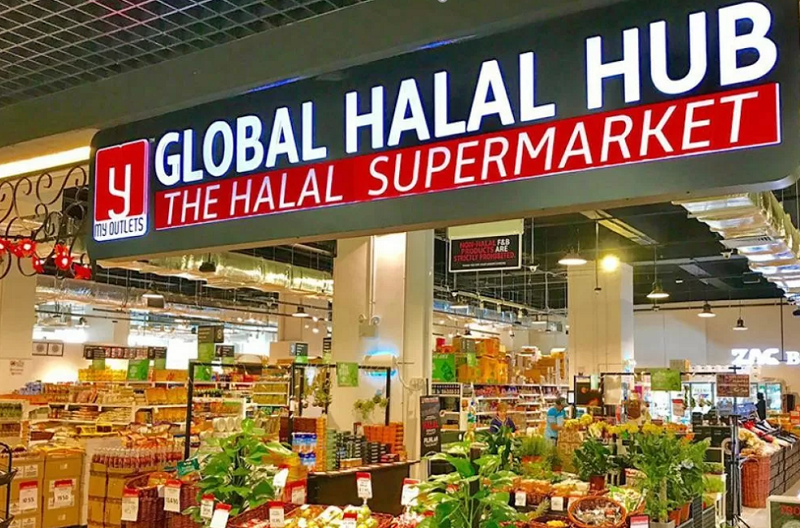
How to Identify Halal Products in the Market
With the rise of Halal products, consumers need to know how to identify and verify their authenticity. Here are some guidelines:
Tips for Identifying Halal-Certified Products
- Look for the Halal Logo: The easiest way to identify a Halal product is to look for the Halal certification logo on the packaging. This logo is issued by an authorized Halal certification body after the product has undergone a rigorous inspection process.
- Note that there are many different Halal certification bodies around the world, and their logos may differ. Some logos are more common and widely recognized than others.
- Read the ingredient list carefully: Even if there is no Halal logo, you can check the ingredient list for potential Haram substances. Pay attention to:
- Types of meat (ensure it is marked “Halal” if it is beef, chicken, or lamb).
- Gelatin (check the source – Halal beef, fish, or plant-based is acceptable; pork or beef of unknown origin should be avoided).
- Enzymes (check the source).
- Glycerine/Glycerol (prefer plant-based sources).
- Alcohol/Ethanol (avoid if it is a main ingredient, except in special cases like flavorings in very small amounts or fatty alcohols).
- Animal fats (Lard, Tallow – check for Halal origin).
- Extracts from insects (e.g., Carmine/Cochineal – E120, often considered Haram).
- Check the brand or manufacturer: Some brands specialize in Halal products or have a long-standing reputation in the Muslim community. Researching the manufacturer can provide more information.
- Ask the retailer or manufacturer: If you are unsure, do not hesitate to ask store staff or contact the manufacturer directly to confirm the Halal status of the product.
The Role of Halal Logos and Certification
The Halal logo plays an extremely important role in building trust and ensuring transparency for consumers:
- Quick identification mark: The Halal logo is a visual guide that helps Muslim consumers save time and effort when shopping, eliminating the need to read and analyze every ingredient.
- Ensures compliance with standards: The logo confirms that the product has been inspected and approved by an independent third party, ensuring that it meets strict Halal standards.
- Enhances credibility: The presence of a logo from a reputable certification body increases the credibility of the product and brand in the eyes of consumers.
- Facilitates trade: An internationally recognized Halal logo helps products gain acceptance in different markets around the world.
However, it is important to recognize logos from reliable Halal certification bodies, as not all logos are of equal value.
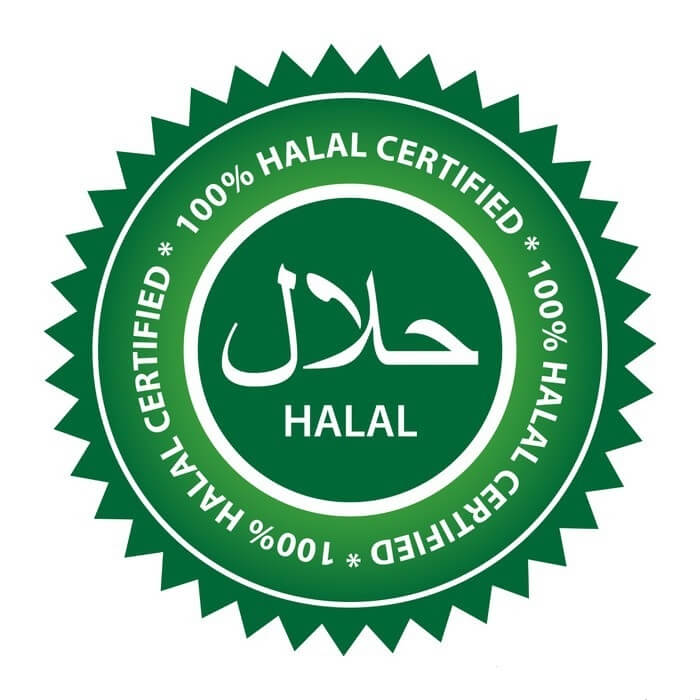
How to Verify the Authenticity of Halal Claims
Sometimes, consumers may want to further verify the authenticity of a Halal certification or learn about a specific certification body. Here are some ways:
- Check the certification body’s website: Most reputable Halal certification bodies have websites that list the companies and products they have certified. You can visit the website of the organization whose logo is on the packaging to check if the product is actually on the certified list.
- Use mobile apps: There are several mobile apps developed to help consumers scan product barcodes or search databases of certified Halal products. These apps can provide quick and convenient information.
- Consult online databases: Some websites or local Islamic organizations maintain databases of Halal products available in their area.
- Contact the certification body directly: If you have any doubts about the validity of a logo or certification, you can contact the certification body directly to request verification.
- Look for international recognition: Check if the certification body is recognized by international Halal regulatory authorities or the governments of major Muslim countries (e.g., JAKIM of Malaysia, MUI of Indonesia, GAC of the Gulf countries). This recognition is often a sign of reliability.
By applying these methods, consumers can be more confident in choosing products that truly meet Halal standards.
Conclusion: Understanding What Halal Is and Its Importance
Through this article, we have explored in depth the concept of what halal is. Halal is not merely a term for food that is “permissible” in Islam, but a comprehensive system of principles, derived from Islamic law (Sharia), that governs many aspects of a Muslim’s life. From food, finance, cosmetics to tourism, Halal emphasizes ethical, wholesome, and lawful practices, and expresses obedience to God.
The core principles of Halal include avoiding Haram substances (such as pork, alcohol), ensuring humane slaughter processes (Zabiha), and preventing cross-contamination. Halal certification plays a crucial role in ensuring compliance with these standards, building consumer trust, and opening up opportunities to access the promising global Halal market.
Understanding and considering the importance of Halal offers many benefits. For Muslims, it is the foundation for practicing their faith, bringing spiritual peace and strengthening the community. For everyone, Halal standards often equate to safe, high-quality, and ethically produced products. At the same time, learning about Halal helps us respect cultural and religious diversity, as well as seize opportunities in a rapidly growing global market.
Whether you are a Muslim seeking to better adhere to religious principles, a business looking to expand its market, or a consumer interested in quality and ethical products, hopefully this article has provided useful information on “what halal is”.
To learn more, you can explore the websites of reputable Halal certification bodies in your country or around the world, or consult educational materials on Islamic law and its applications in modern life. A clear understanding of Halal will undoubtedly enrich your knowledge of the diverse world we live in.
Frequently Asked Questions (FAQ)
Halal is an Arabic term meaning “permissible” or “lawful” according to Islamic law (Sharia). It refers to actions, foods, products, or services that Muslims are permitted to use or engage in.
Haram is the opposite term of Halal, meaning “prohibited” or “unlawful” according to Islamic law. Examples of Haram include pork, alcohol, blood, and financial transactions based on interest (Riba).
Zabiha is the ritual slaughter of animals according to Islamic law for the meat to be considered Halal. The process includes invoking the name of Allah, using a sharp knife to make a swift cut to the throat to drain the blood completely, and ensuring the animal is treated humanely.
4. Why is Halal certification important?
Halal certification is important because it provides assurance to consumers (especially Muslims) that a product complies with the strict requirements of Islamic law. It builds trust, helps in easy product identification, and opens doors for businesses to access the global Halal market.
5. Does Halal only apply to food?
No. Although most common in the food sector, Halal principles also apply to many other areas such as finance (Islamic banking), cosmetics, pharmaceuticals, tourism, fashion, and general ethical conduct.
6. How can I identify a Halal product?
The easiest way is to look for a Halal logo on the product packaging issued by a reputable certification body. You can also read the ingredient list carefully to avoid Haram substances, research the manufacturer, or contact them directly for confirmation.

